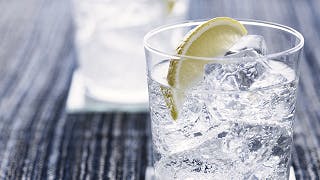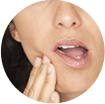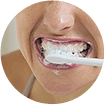What is Enamel Wear?
Enamel is the hard outermost surface of a tooth. Although it’s harder than any other substance in the body, over time it can gradually wear away to expose the dentine beneath, which may lead to eroding teeth and tooth sensitivity.
If you suffer from sensitive teeth, visit your dentist who can identify signs of tooth erosion and help you devise a treatment plan, which can include de-sensitising fluoride treatments given at your dentist’s office and recommendations for toothpastes for sensitive teeth to use at home.5
Enamel wear can be caused by:
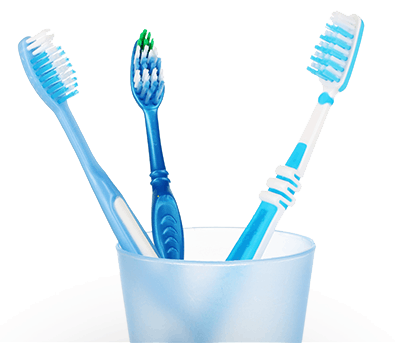
Tooth Grinding
Do you grind your teeth, either at night or during the day? If so, you may be wearing down the enamel, which over time can expose the underlying dentine.
Tooth Brushing
If you brush too frequently or too hard, eventually your tooth enamel may be worn away or you could develop receding gums.
To prevent this, ask your dentist or hygienist for advice on the best tooth brushing technique and oral hygiene routine for you, and try using a soft-bristled toothbrush.
Acidic Foods and Drinks
When you eat or drink anything acidic, the acid causes your tooth enamel to become softer for a while and it loses some mineral content. Saliva is more alkaline to counteract this, but if acid attacks happen too frequently, your mouth doesn’t have time to redress the balance. As a result, over time your teeth will lose bits of enamel and tooth erosion occurs.1
Two of the most common food and drink groups that cause tooth erosion are fizzy drinks and fruit.2
You can reduce the impact that carbonated drinks have on your mouth by limiting your consumption, swallowing quickly without ‘swishing’ them in your mouth, and using a straw.3
To help protect your teeth from the effects of acidic fruits – with citrus fruits being the most acidic – try to limit your consumption of fruit to mealtimes and eat whole fruits rather than drinking juices.4
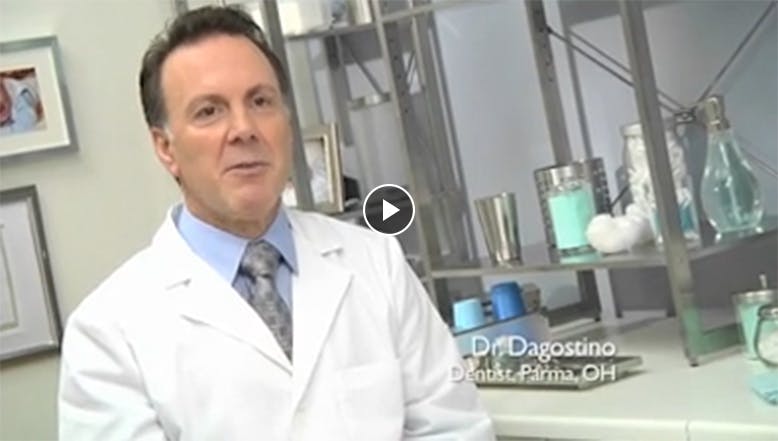
Tip: Your dentist can spot the early signs of tooth wear so it's important to go for regular dental check ups. If you think you might be at rist of enamel wear, talk to your dentist.
Enamel Wear Precautions
You can reduce your risk of tooth enamel erosion, or help to prevent existing wear from becoming worse, with the following precautions:
- Avoid drinking fizzy drinks or cut down your consumption of them. If you do drink a carbonated drink, use a straw.6
- Wait for an hour after you eat acidic foods before you brush your teeth. This gives your mouth time to rebalance its pH levels and allow your enamel to reharden.6
- Neutralise your mouth after acidic foods or drinks by drinking water, having a glass of milk, or eating cheese. Calcium-rich foods and drinks like dairy items can help to neutralise acids.6
- Use a toothpaste that helps to protect against enamel erosion, like the Sensodyne Pronamel range.5
It’s important to protect your teeth against enamel wear because enamel is a non-organic tissue that cannot regrow7.
Enamel Wear Treatments
There are, thankfully, several ways to treat and protect your teeth that are impacted by enamel erosion and sensitivity. Suitable treatments depend on the type and severity of the erosion8. Treatments can include:
- Fluoride varnishes or gels applied to the teeth.9
- Using neutralising agents like antacid tablets.9
- Dentine bonding agents to protect exposed dentin.9
- Fillings or crowns being placed over holes in teeth caused by acid attacks and enamel erosion.10
- Bonded veneers can be used for patients with severe tooth erosion.11
Enamel Wear FAQs
Can Damaged Tooth Enamel Be Repaired?
Tooth enamel cannot grow back once it’s been worn down7, but it can be repaired, and the sensitivity treated.
Enamel can be rebuilt by using a repairing toothpaste twice daily – our Sensodyne Pronamel range includes toothpastes that help to repair your tooth enamel and reduce sensitivity.
Your dentist can also recommend other treatments that may be necessary to protect your natural teeth and guard against further enamel erosion5.
Can Enamel Repair Itself?
Enamel cannot naturally repair itself. As a non-organic tissue, it doesn’t have the ability to regrow.7 You should visit your dentist to determine the extent of your enamel erosion and the best ways to treat it.5
Does Tooth Whitening Remove Enamel?
Some at-home whitening kits can damage your tooth enamel12. If you want to whiten your teeth, use a whitening toothpaste that protects your enamel such as Sensodyne Repair and Protect Whitening, or visit a registered dentist for a professional whitening treatment13.
What Toothpaste Helps Rebuild Enamel?
The Sensodyne Pronamel range helps to protect your enamel from further erosion, rebuilds its strength, and relieves tooth sensitivity. While tooth enamel can’t be regrown7, it can be strengthened, remineralised, and protected from future acid erosion14 by using Sensodyne toothpaste twice daily.
Sources:
- Oral Health Foundation. Dental Erosion. https://www.dentalhealth.org/dental-erosion. Accessed 11/10/2021.
- Oral Health Foundation. What foods and drinks contain acid and why it spells trouble for our oral health. https://www.dentalhealth.org/blog/what-foods-and-drinks-contain-acid-and-why-it-spells-trouble-for-our-oral-health. Accessed 11/10/2021.
- Oral Health Foundation. What foods and drinks contain acid and why it spells trouble for our oral health. https://www.dentalhealth.org/blog/what-foods-and-drinks-contain-acid-and-why-it-spells-trouble-for-our-oral-health. Accessed 11/10/2021.
- Oral Health Foundation. What foods and drinks contain acid and why it spells trouble for our oral health. https://www.dentalhealth.org/blog/what-foods-and-drinks-contain-acid-and-why-it-spells-trouble-for-our-oral-health. Accessed 11/10/2021.
- Oral Health Foundation. What foods and drinks contain acid and why it spells trouble for our oral health. https://www.dentalhealth.org/blog/what-foods-and-drinks-contain-acid-and-why-it-spells-trouble-for-our-oral-health. Accessed 11/10/2021.
- Mouth Healthy. Erosion: What You Eat and Drink Can Impact Teeth. https://www.mouthhealthy.org/en/az-topics/e/dietary-acids-and-your-teeth. Accessed 11/10/2021.
- Dentaly. Tooth Enamel Repair: How to Strengthen and Remineralise Teeth. https://www.dentaly.org/en/oral-health/enamel-repair-remineralization/. Accessed 11/10/2021.
- Herman Ostrow School of Dentistry of USC. What is Tooth Erosion? Causes, Diagnosis, and Treatment. https://ostrowon.usc.edu/2019/08/01/tooth-erosion/. Accessed 11/10/2021.
- Herman Ostrow School of Dentistry of USC. What is Tooth Erosion? Causes, Diagnosis, and Treatment. https://ostrowon.usc.edu/2019/08/01/tooth-erosion/. Accessed 11/10/2021.
- NHS. Tooth Decay. https://www.nhs.uk/conditions/tooth-decay/. Accessed 11/10/2021.
- Luís Henrique Schlichting, Tayane Holz Resende, Kátia Rodrigues Reis, Pascal Magne. Simplified treatment of severe dental erosion with ultrathin CAD-CAM composite occlusal veneers and anterior bilaminar veneers. https://pubmed.ncbi.nlm.nih.gov/27132785/. Accessed 11/10/2021.
- NHS. Teeth Whitening. https://www.nhs.uk/live-well/healthy-body/teeth-whitening/. Accessed 11/10/2021.
- NHS. Teeth Whitening. https://www.nhs.uk/live-well/healthy-body/teeth-whitening/. Accessed 11/10/2021.
- Dentaly. How to Remineralize Teeth: Strengthen and Repair Tooth Enamel. https://www.dentaly.org/us/oral-health/remineralize-teeth/. Accessed 11/10/2021.
PM number: PM-ZA-SENO-21-00168
ABOUT SENSITIVITY


